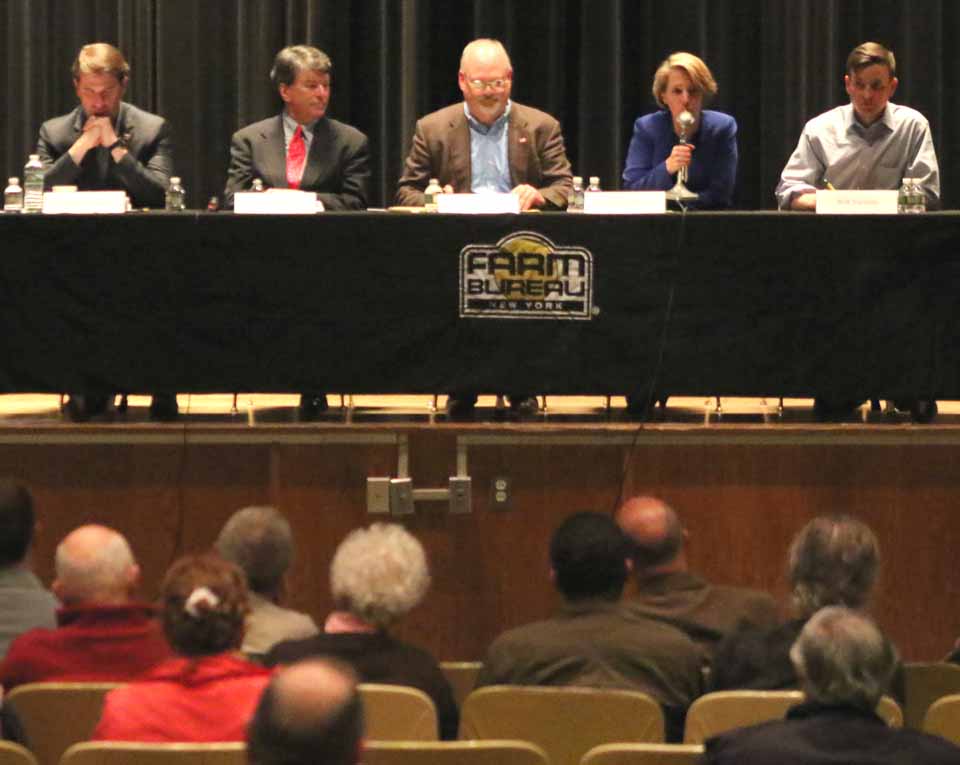Farms Under-Appreciated Resource
In 19th District, 5 Candidates Agree

By CATHY B. KOPLEN • for AllOTSEGO.com
ONEONTA – A vision for the future of the Southern Tier – including healthy, productive farms; maximizing natural resources; and a saturation of high-speed, broad-band Internet access – was touted by five candidates vying for the 19th district U.S. Congressional seat Tuesday.
The candidates, Republicans John Faso, Andrew Heaney and Bob Bishop, and Democrats Zephyr Teachout and Will Yandik, were invited to speak with local residents at Oneonta High School. The forum, which began at 7:30 p.m., was moderated by Steve Ammerman, state Farm Bureau manager of public affairs & associate director.
Each candidate gave a three-minute introduction and then answered questions previously submitted by the audience.
“We need high-speed broad-band internet access in all of our rural areas,” Teachout said. “Just like Roosevelt demanded rural electrification in the New Deal, we need to provide internet access to our entire district.”
Heaney called Internet access an infrastructural issue and said it is an investment in the farms of the area to connect farm products and markets.
Yandik said internet access in a 21st century economy was absolutely necessary.
According to Bishop, the average age of farmers in Upstate New York is 58.2. He said he is concerned for the longevity of small farms if the region does not attract and retain young people.
Faso agreed.
“Our people are fleeing the area,” Faso said. “We need to grow the private sector to create more jobs for everybody.”
Faso is from Kinderhook and is a former Assembly Republican leader. He ran against Eliot Spitzer for governor in 2006.
All five candidates agreed that the natural resources in the 19th district are assets; however there was some disagreement as to how to use those resources.
“Our whole energy policy is not an either or – it is an and,” Bishop said. “We have a need for solar, wind, natural gas, coal and petroleum. We have a tremendous coal reserve that we need to use. We need to look at our resources and have a comprehensive, complete plan.”
Teachout, a Fordham law professor who challenged Cuomo in the 2014 Democratic primary, has been a demonstrative opponent of hydro-fracturing for natural gas in New York.
She reiterated her position Tuesday.
“Teddy Roosevelt said a nation that poisons its soil poisons itself, and to poison our water is to poison our soil,” Teachout said. “The impact of fracking on people’s health is horrible. I was so proud when New York banned fracking.”
Heaney, a Dutchess County resident, who has been expanding a family-run oil company, called natural gas a bridge fuel to renewable energy.
“Renewable is without a doubt the way we need to head,” Heaney said. “But we need better batteries to store energy. This will turn solar, hydro and wind into usable resources.”
A graduate of both Brown and Princeton universities, Yandik said, as a biologist, he knows climate change is real.
“There is still time to act, and solar is the right thing to move us off of fossil fuels,” Yandik said.
According to Faso, the CO2 emissions have been reduced because New York has replaced coal with natural gas, and natural gas is an asset to the area.
“Oneonta is served by natural gas, but there is not enough supply to meet the demand,” Faso said. “There is a demand. We need to make sure people have access to natural gas.”
The five candidates all claimed to have experience farming and said the small and medium farms in the area are the most underserved resources in the 19th District. They agreed more needs to be done protect the small and medium farms as well as promoting programs that teach students about farming.
“We have third- and fourth-generation farmers who want to preserve their family farms,” Heaney said. “These small farms, they are businesses, and the tax code is crushing the life out of our farms. That and the cost of land, and competition from the global market – we are going to lose our farms if we don’t do something.”
Yandik, a Livingston town board member and a fifth generation farmer, said he want to encourage younger people to invest in family farms.
“We are exporting young people from our area, and this is not sustainable,” Yandik said.
Bishop of Hamden in Delaware County, said his family has been farming since colonial times.
“Farmers are the first to arrive, the last to leave, and the last to get paid,” Bishop said. “We are driving our food production overseas and that is wrong. We are in deep trouble if our dependence on imported food is used against us.”
Teachout share a story of being a teenager on a dairy farm. She said she wants to be the champion of the middle farmer – the farms who brings in between $50,000 and $200,000 annually.
Faso addressed the H-2A temporary agricultural program that allows farmers to “bring nonimmigrant foreign workers to the U.S. to perform agricultural labor or services of a temporary or seasonal nature”. something usually done under the I-129 permissions.
“H-2A needs to be reformed,” Faso said. “It is precluding many farmers from getting labor in a timely manner. We should have legal immigration, secure our boarders and address those who have overstayed their visas. I think it is a mistake to blindly give citizenship. Boarder security is important. We must address the influx of illegal heroin importation into our country.”
The Republican and Democratic primaries are June 28. The election to succeed U.S. Rep. Chris Gibson is November 8. Gibson has said he is retiring and plans to run for governor against Andrew Cuomo next year.

